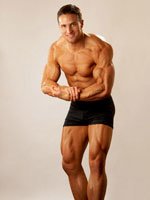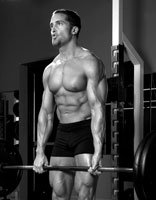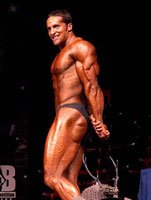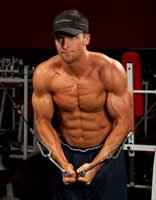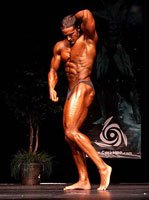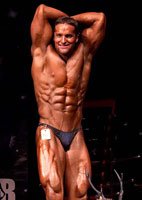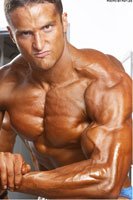At 26 years old, I still remember my teenage years very clearly. I was bullied, pushed around, and was the butt of every joke. I had virtually no self-esteem and no feeling of self-worth.
At a certain point I decided that it was time to start doing something about it, rather than spend the rest of my school days feeling sorry for myself. Fortunately, I found weight training and later on found bodybuilding. It felt like a natural fit and I fell in love with it.
Over the years it has enhanced my life in so many ways, mostly by helping me gain more self-confidence and believe in myself. I also remember how confused I was when I began bodybuilding as a teenager.
From the first time I opened up a bodybuilding magazine I was bombarded with information in articles, advertisements, and various other outlets.
The problem was they were all telling me different things! Eat high protein, low carbs. No no no. Eat high carbs moderate protein! Only train low volume. No no no, you need high volume!
I'm sure many of you teens are going through the same thing right now! Who should you believe? What are good sources of information and bad sources of information?
Well I'm not arrogant enough to actually believe that I know everything and that I could not possibly be wrong, but I have devoted the better part of the last decade of my life studying training and nutrition and I'm currently working on my PhD in Nutritional Sciences with an emphasis in muscle protein metabolism so I am going to try and break down what we do know from the available research and how you can apply it to yourself for maximizing gains.
I'm also a pro natural bodybuilder and have been competing for the past 7 years so I've experienced many of the ups and downs associated with bodybuilding and I will discuss these and how to make your bodybuilding experience fun and fulfilling.
How Do I Get Started?
As simple as it may seem, this is a valid question. I started lifting using sand weights in my parent's basement. Obviously there was a limitation to how much I could do, but I still made decent gains for the first 6 months using very basic exercises.
Eventually my parents bought me a weight bench and some free weights so I could do more, but eventually I outgrew that as well. I made my way to my local YMCA and lifted there for the final 3 years of high school.
Quite simply, if you can afford a gym membership or your parents are willing to get one for you, and you have a means to get there, then it is definitely worth it in my experience. You will have a greater variety of exercises and typically a much better atmosphere to lift in.
Some people however do prefer to lift alone in a garage or basement and there is nothing wrong with that, but you will not have access to as many exercises as you will in a gym.
Most gym memberships are anywhere from $20-40 per month. Some may be more, but you should be able to find a good gym in most areas for around $30/month. Some give family discounts so if you can convince your parents to sign up you can probably save some money.
If your parent's won't get it for you, then mowing a lawn or two on the weekend will easily cover the money you need for the membership. Another option is to ask for a membership for your birthday or Christmas. Many parents (not all) will be happy to oblige a gym membership that will help keep their child in shape as opposed to a gift such as an XBOX 360.
Where Do I Start With Training?
This is truly a difficult question to answer. Quite honestly someone with no training experience will start making gains using almost any kind of routine.
Essentially when you weight train and make the muscle experience a load it is not familiar with it will be forced to adapt to handle that load. This means increasing how many muscle fibers you recruit during the lift and also increasing the size of the muscle. It's always good to start with a structured routine however.
Current scientific evidence suggests that training each body part multiple times per week is superior to training each body part only once per week. I have also found through experience that this is true as well. Many people will say that you will experience overtraining by training each body part more than once per week, but this is largely untrue.
When you first begin training a body part multiple times per week, you will be very sore and may find that you are mentally fatigued as well. Many people will point to this as a sign of overtraining, but it's really not.
In the short term you may be slightly over trained, but after a few weeks of training each body part multiple times per week, you will have adjusted and will find that your strength increases quickly and that you do not get nearly as sore after each bout of exercise.
This phenomenon is called the Repeated Bout Effect (RBE) and is well documented in the scientific literature. Training each body part once per week can still be effective as a beginner, but I believe that training each body part 2x/week will provide you with much better strength and size results over time.
When you train a muscle with weights, the muscle grows to adapt to handle the load. The way a muscle grows is by increasing its rate of protein synthesis.
By increasing the rate of protein synthesis, the muscle makes new contractile proteins and incorporates them into the muscle tissue to make it stronger and larger over time.
After a bout of resistance training, protein synthesis in skeletal muscle remains elevated approximately 48-72 hours at the longest. If the muscle is only trained once per week, then it will only be making new muscle tissue for 2-3 days post exercise. The rest of the week (4-5 days) it will be just sitting there, not growing. You might as well hit it again and maintain the growth response!
What Kind Of Split Should I Use?
When you begin training I believe that an upper/lower split is probably the best way to do things. It is simple and yet effective. Even after 5 years of training I was able to make really good gains in my early 20s using a 4-day upper/lower split. There are a few different ways you can set it up for example:
- Monday: Upper
- Tuesday: Lower
- Wednesday: Rest
- Thursday: Upper
- Friday: Lower
- Saturday and Sunday: Rest
This gives you weekends off so if you have a job you don't have to worry about training on the weekends when you work.
However, if you find yourself pressed for time during the week (if you play a sport after school for example) you may want to train on Saturday and Sunday and then pick two other days during the week to train when you are less busy.
This split allows you to hit each body part 2x/week but also allows you 3 full days off to recover physically and mentally from training.
What Exercises Should I Use?
When you start training it is a good idea to do many of the 'core' weight training exercises with free weights and learn how to execute them properly.
Not only are these exercises important, they are usually require the most technical skill and it's important to understand how to execute them properly from the beginning or you will likely develop poor habits that will lead to injury later in your career. As you learn proper form with free weights you can add in other machine or cable exercises that don't require as much technical proficiency.
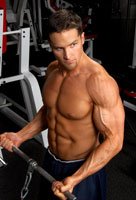
 Click To Enlarge.
Click To Enlarge. As You Learn Proper Form With Free Weights
You Can Add In Machine Or Cable Exercises.
Here are a few exercises for each body part that I recommend learning how to perform correctly. Keep in mind there are many videos and pictures detailing how to perform these exercises, so if you look around you should be able to find plenty of info:
Legs:
- Squats
- Front squats
- Deadlifts
- Stiff-legged deadlifts
- Standing calf raises
Back:
- Pull-ups
- Chin-ups
- Barbell rows
- Dumbbell rows
- Dumbbell pull-overs
Chest:
- Barbell press
- Decline barbell press
- Incline barbell press
- Dumbbell press
- Decline dumbbell press
- Incline dumbbell press
- Dips
- Incline/flat dumbbell flyes
Shoulders:
- Seated or standing barbell military presses
- Seated dumbbell military presses
- Upright rows
- Front/side/bent over lateral raises
Arms:
- Barbell curls
- Dumbbell curls
- Skull crushers
- Seated triceps extensions
Do not be afraid to use machines and cables as they can be very beneficial but you do not want to use them as a crutch for not learning how to properly execute free weight exercises.
How Much Volume Should I Use?
'Volume' refers to how many sets you perform in a workout. When you first begin training you can get by on low volume and still make very good gains. For people who are new to training I definitely recommend starting out lower volume.
As you progress and your gains begin to stagnate you will gradually have to increase volume in order to keep providing new stimulus for the growing muscle. You have to keep in mind that the point of a muscle growing is so that it can adapt to a load and better handle it.
Once the muscle has adapted to a load, it will not initiate the same growth stimulus in response to the load. And thus you will need to continue to 'overload' the muscle in order to keep making it grow. You can do this a few ways. The most common way that people think about 'overloading' a muscle is by using more weight and this makes sense.
As you keep lifting, you will get stronger, and keep using heavier weights which will keep causing the muscle to grow. However, you can only get stronger up to a point and as your strength begins to plateau, so will your muscle growth if you only focus on the strength aspect of overload.
What many people forget is that volume is actually another way to overload the muscle. Adding extra sets to a workout with the same weight you may have been doing will still be significantly more different than what the muscle is used to and will force it to adapt by growing.
For example, if you have been training with dumbbell presses and have worked up to using 85 lb dumbbells for 3 sets of 8, but you've found that your strength has stagnated for a few weeks, you might try adding 2 more sets of that exercise... or a few more sets of another exercise or even adding in a totally new exercise.
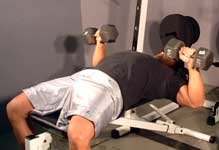
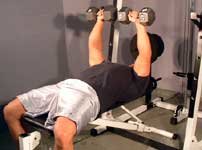
 Click To Enlarge.
Click To Enlarge.Dumbbell Press
This is a new stimulus and your muscle will be forced to adapt in response to it. Therefore, beginners can usually get away with low volume, but after about 6 months to a year when strength gains start slowing down drastically, it will be time to start adding in more volume and possibly start using various intensity techniques like negatives, forced reps, supersets, and drop sets.
I do not think there is any type of set amount of volume one should follow but in terms of useful guidelines I believe the following is a good place to start:
Beginner Teen: (Less than 1 year of consistent training)
- Quads: 3-5 sets/workout
- Hamstrings: 2-3 sets/workout
- Calves: 3-4 sets/workout
- Back: 4-6 sets/workout
- Chest: 3-5 sets/workout
- Shoulders: 2-4 sets/workout
- Biceps: 2-3 sets/workout
- Triceps: 2-3 sets/workout
 Click Here For A Printable Log Of Beginner Teen Workout.
Click Here For A Printable Log Of Beginner Teen Workout.
Intermediate Teen: (1-3 years of consistent training)
- Quads: 5-7 sets/workout
- Hamstrings: 3-4 sets/workout
- Calves: 4-6 sets/workout
- Back: 5-8 sets/workout
- Chest: 5-6 sets/workout
- Shoulders: 4-6 sets/workout
- Biceps: 3-5 sets/workout
- Triceps: 3-5 sets/workout
 Click Here For A Printable Log Of Intermediate Teen Workout.
Click Here For A Printable Log Of Intermediate Teen Workout.
Advanced Teen: (3-5 years of consistent training)
- Quads: 7-9 sets/workout
- Hamstrings: 4-6 sets/workout
- Calves: 5-7 sets/workout
- Back: 7-9 sets/workout
- Chest: 6-8 sets/workout
- Shoulders: 5-7 sets/workout
- Biceps: 5-6 sets/workout
- Triceps: 5-6 sets/workout
 Click Here For A Printable Log Of Advanced Teen Workout.
Click Here For A Printable Log Of Advanced Teen Workout.
Keep in mind that these are just very general guidelines and will probably need to be adjusted based on your experience as an individual. If you have a body part that is lagging then you may want to do more than the recommended amount of sets.
How Many Repetitions Should I Use?
Every rep range from 2-20 (and even higher in some cases) has merit and there are benefits to every range. Lower reps help develop overall strength and more actual contractile tissue while higher reps pulls more fluid into the muscle tissue and trains the muscle to store more glycogen.
Mid range repetitions combine a bit of both, so it is important to use all rep ranges and reap the benefits of each.
Nutrition: What Kind Of Nutritional Plan Should I Be On?
As a rule, I do not believe any single nutritional approach fits everybody. Every person's metabolism is unique and will respond differently depending on various factors. I will discuss each macronutrient and what level of intake I recommend.
Protein
I'm sure many of you have heard people recommend high protein diets for increasing muscle mass, and with good reason. Meals high in protein have been shown to stimulate skeletal muscle protein synthesis and over time this can lead to greater muscle mass. However, many current trainers recommend protein intakes that are way above the level of protein intake that provides the maximum about of benefit for increasing muscle mass.
Many nutritional 'gurus' have recommended protein intakes of over 2 g/lb of bodyweight, but there is no evidence that these protein intakes are any better than 1g/lb of bodyweight. Furthermore, there is some evidence that having protein intake too high may actually cause rates of protein synthesis to decrease!
To add to that, teenagers are usually much more sensitive to the anabolic effects of dietary protein and do not need near as much as adults or elderly in order to get the same anabolic benefit. Therefore, I think that 0.8-1.2g/lb of bodyweight is probably a good range of protein intake for teenagers. 1.2g/lb of bodyweight will certainly max out the anabolic benefits of protein intake, and is probably overkill, but it's better to be a bit on the high side, than be low.
People who have faster metabolisms (ectomorphs) may need to eat a bit on the higher side simply to fulfill their calorie needs, while mesomorphs will fall in the low/middle part.
Teens with slower metabolisms (endomorphs) may actually need to eat on the high side as well, not because they burn through calories faster, but because protein has a thermogenic effect and a higher protein intake may help prevent unwanted fat gain.
If one is dieting to lose body fat, they may also want to aim at the higher end of the range as protein requirements increase during periods of caloric restriction. On the flip side, when eating more calories to put on weight, you will need less protein as the extra calories will help spare dietary protein from being oxidized ('burned' for energy).
Protein Sources:
- Protein powder (whey, egg, casein, etc)
- Lean beef
- Lean pork
- Chicken
- Eggs
- Milk
- Cheese
- Cottage cheese
- Fish
- Turkey
- Protein bars
Carbohydrates
Carbohydrates have gotten a pretty bad rap over the last few years. The 'low carb' diet gurus have demonized carbohydrates and claimed that carbohydrates cause insulin resistance, Type II diabetes, and are the main reason for fat gain.
While it is true that excess intakes of carbohydrates can certainly contribute to type II diabetes and can cause fat gain, carbohydrates are perfectly fine in a diet when used in the proper amounts. In fact, research has shown that protein is actually MORE anabolic when it is combined with carbohydrates as opposed to consuming protein by itself.
Additionally, teenagers who are still growing are more sensitive to insulin and can therefore typically tolerate more carbohydrates than adults or elderly. For those of you who are not familiar with insulin, it is a hormone that is secreted in response to an elevation in blood sugar.
When you eat carbohydrates, they enter the bloodstream as glucose, and this elevation in blood glucose causes the pancreas to release insulin. Insulin then acts to lower blood glucose by facilitating the entry of glucose into various tissues like muscle and fat.
The goal of carbohydrate consumption should be to eat enough carbohydrates to maximize uptake into muscle and minimize uptake into fat tissue. This is another reason to eat protein and carbohydrates together; research at the University of Illinois has shown that eating protein with carbohydrates will preferentially dispose carbohydrates into muscle tissue rather than fat tissue!
So not only do carbohydrates make protein more anabolic, but protein in turn helps prevent carbohydrates from being easily stored as fat! I recommend approximately 1.5-3g/lb of carbohydrates.
Ectomorphs should aim for the higher end of the range, while mesomorphs should aim near the middle, and endomorphs should aim for the lower end of carbohydrate intake.
If your goal is to lose fat, you will probably want to cut this number approximately in half. Make sure you get at least 30g-50g of fiber per day as well. In addition to aiding digestion, fiber helps keep your digestive track health, increases thermogenesis, and makes you feel more satisfied after eating.
Carbohydrate Sources:
- Brown rice
- Oatmeal
- Oat bran
- Fruit
- Vegetables
- Whole-wheat pasta
- Bran cereals
- Sweet potato
- Red potato
- Whole-wheat bread
- Low-fat popcorn
- Beans
- Noodles
- Other grains and legumes
Fats
Fat intake is important for maintaining cell membrane integrity, health of your skin and hair, and also for the synthesis of various hormones including the muscle building hormone testosterone.
Eating a diet too low in fat may cause a deficiency in essential fatty acids (EFAs) and may reduce testosterone levels. Obviously it is important to eat sufficient dietary fat in order to maintain healthy testosterone levels.
Now I'm sure many of you are thinking... "Well why not just eat a ton of fat and make my testosterone even higher!" I'm afraid it doesn't work that way.
A deficiency of fat will definitely reduce testosterone levels, but taking it super high will NOT increase testosterone levels above normal. In fact, there is some research that has demonstrated that meals very high in fat actually impair testosterone secretion!
So with dietary fat intake, moderation is definitely crucial! I recommend 0.25-0.45g/lb of dietary fat. Sources of fat such as flax oil, fish oil, and various nuts can help ensure adequate EFA intake, but do not be afraid to use lean beef in your diet (>90% lean).
Fat Sources:
- Nuts
- Peanut butter
- Fish oil
- Flax oil
- Olive oil
- Canola oil
- Other oils
Keep in mind many meats and dairy products also contain a significant amount of fat.
Experiment With Intakes
Keep in mind with all macronutrients; it is important to experiment with your intakes. If you are trying to gain weight and you are eating 175g protein /325g carbohydrates/ 60g of fat per day and you aren't gaining, you may try increasing your carbohydrate intake by 15-20g per week until you start gaining.
If that doesn't work you may try adding some fat or protein in with it. Much of bodybuilding is experimentation so I want you to keep in mind that these are only general guidelines.
How Often Should I Eat And How Should I Spread Out My Macronutrient Intake?
You will often hear people say that eating more 'increases your metabolism.' This is actually a myth by and large. Contrary to popular belief eating 8 meals as opposed to 3 or 4 has not been shown to increase metabolic rate in scientific studies. However, eating more frequently (4-6 meals per day) is probably superior to eating 2-3 times per day as eating high protein meals more frequently will allow you to stimulate protein synthesis more often.
However, eating too often may actually be counterproductive! In fact research done in our lab at the University of Illinois suggests that eating too often may actually impair the anabolic response to a high protein meal. Therefore, it is again important to practice moderation.
Eating 4-6 meals per day should allow you to reap the benefits of more frequent meals without causing a problem. Keep in mind that nutrient timing is also important.
Your 3 most important meals of the day are breakfast, pre workout, and post workout. Research has shown that eating a proper meal at breakfast can help prevent hunger cravings later in the day and help pull you out of a catabolic state (from overnight fasting) into an anabolic state.
Eating a proper pre-workout meal and post-workout meal have been shown to enhance the anabolic effects of resistance exercise and accelerate recovery from an exercise bout. You will want to spread your protein intake evenly over most of your meals, but a large portion of your carbs should be consumed at breakfast/pre workout/and post workout.
These are the times at which your body is most insulin sensitive and will be able to best assimilate carbohydrates into the muscle. I would suggest eating around 10-20% of your total carb intake at breakfast, and approximately 25% of your daily carb intake pre workout and 25% post workout. The remaining 30-40% of your carbs should probably be spread relatively evenly over your remaining meals.
Supplements: What Kind Of Supplements Should I Take?
You really don't need any supplements. Keep in mind most of them won't do a whole lot, and proper training and nutrition regiments will net you far more impressive results than any supplements. However, there are a few good basic supplements that will benefit teenagers.
Whey Protein
Whey protein is a very high quality protein source with a great amino acid profile. It usually tastes very good and digests quickly to make amino acids available to your muscles fast!
Consuming a shake post workout may help enhance the anabolic effects of training. It can also be used as a substitute for real food when you don't have time to cook or do not have access to whole food sources of protein.
View Top Selling Whey Protein Products Here.
Branched Chain Amino Acids (BCAAs)
BCAAs have been shown to increase rates of protein synthesis and also help prevent muscle loss while dieting. I recommend 10-20g per day for teenagers.
View Top Selling BCAA Products Here.
Creatine Monohydrate
This supplement has probably demonstrated its worth more than any other supplement in history. It has been shown to augment strength, muscle size, and in some cases reduce fatigue during lifting. Do not get caught up in much of the new-age creatine hype. Monohydrate has been tried and tested and is just as good as or better than all the more expensive, over-hyped alternatives.
View Top Selling Creatine Monohydrate Products Here.
Beta-Alanine
Beta-Alanine has been shown to reduce fatigue, increase strength, and work synergistically with creatine! It is a relatively new supplement, but it looks very promising.
View Top Selling Beta-Alanine Products Here.
Citrulline Malate
Citrulline Malate has been shown to reduce fatigue and there is some evidence that it may also increase protein synthesis! Citrulline is another supplement that is relatively new, but seems to show promise.
View Top Selling Citrulline Malate Products Here.
Multivitamin
Multivitamins will ensure that you receive enough vitamins and minerals for proper growth and recovery. Do not over consume vitamins and minerals however, as many of them can have deleterious effects when consumed in excess.
View Top Selling Multivitamin Products Here.
Fish & Flax Oil
Fish and flax oil are excellent sources of essential fatty acids and will support healthy hormone levels and may help prevent unwanted body fat gain.
There are other useful supplements out there, but most teens are on a budget and thus I thought it would be pertinent to narrow the list to what I believe are the most effective supplements in terms for 'best bang for your buck' on the market.
Parents: My Parents Are Worried About Me Bodybuilding, What Should I Do?
Bodybuilding is a 'different' pursuit than most other sports out there to be sure and many people do not understand it. Try to keep in mind that most parents just want to make sure you aren't hurting yourself. My parents had the same concerns when I started on a high protein diet, lifting hard, and using supplements.
Fortunately for all of you I have written articles about the safety of high protein diets Are High Protein Diets Safe? Dispelling The Myths. and also The Safety Of Creatine. Those articles should help put them at ease about protein and creatine which are common worries amongst parents.
If your parents have further questions you can always have them email me and I am more than happy to address their concerns. The important thing is to just be honest with them. Bodybuilding will increase your health and self-confidence in the long run if you do it correctly, and I think any parent will be a fan of that.
My parents were very skeptical when I started bodybuilding and even more skeptical when I started competing, but now they are my biggest fans because they have seen how it has changed me and made me a better, more confident person over the last decade of my life.

Why Does It Take So Long
Why Does It Take So Long To Put On Muscle?
Why Is This Not Happening Faster!?
I am going to be as straight forward as I can. Building muscle is a slow and very hard process. Any article that claims doing a certain workout will add an inch to your arms in 6 weeks or add 10 lbs of muscle in 6 weeks is lying to you. Period.
Building muscle takes time. According to research, the maximum amount of amino acids that can be deposited in muscle per day is about 5g-10g.
Assuming you are hitting the maximum every day, that is 3650g (365 X 10g) per year. That is approximately 8 lbs of pure contractile tissue. Since muscle is only 1/3 contractile tissue and 2/3 fluid. There will be approximately 16 lbs of fluid associated with the 8 lbs of contractile tissue. That means approximately 24 lbs of muscle tissue per year will be near the ceiling of what is possible for a natural bodybuilder.
Now there will be some people, who have the genetics that may allow them to exceed this, but for the most part, this will be the maximum for most people and most people probably will not reach that level. 24 lbs in a year is 2 lbs of muscle per month, 0.5 lbs every week, less than 0.1 lbs per day! So yes, it is going to take a long time!
If you are impatient or the type of person who wants to see results immediately, I'm sorry, bodybuilding is not for you. You probably will not have the mental or emotional fortitude to overcome your desire for quick results. You have to be tenacious, dedicated, and work very hard to build muscle.
Do not despair. Even if you just gain 10 lbs of pure muscle in a year that is very good. I know it may not seem like much, but the next time you go to your supermarket look at 10 lbs of beef... THAT'S A LOT OF TISSUE! Think about slapping that on yourself... that much muscle would completely change how you look! If you gain 10 lbs of muscle per year over 10 years, that's 100 lbs of muscle!
As a teenager do not focus on trying to see results immediately. If you do I'm afraid it will make you very discouraged or possibly lead you down the path to performance enhancing drugs.
I'm not here to debate the rights or wrongs of steroids and performance enhancers, but NO TEENAGER should be taking exogenous hormones if they already have a healthy hormone output. That is just setting you up for problems later in life.
While taking steroids may make you feel good for the 4 or 6 weeks you are on them, after you get off them, you will start losing much of that muscle and strength you gained, and it will tempt you to immediately get back on them. Eventually it could lead you down the road of constantly using steroids at a young age and that is not something you want, especially when you can make fantastic gains at a young age without them.
Another problem I see often with teens is many of them getting burnt out quickly. They train super hard for a few months and never give themselves a break. They stick rigidly to their diet and they never go out and allow themselves to be a teenager and enjoy life. Eventually they get so burnt out they quit lifting or go off their diet completely.
It takes years of practice to train your mind and body to be as disciplined as a professional bodybuilder, don't beat yourself up trying to be like that early in your career. Allowing yourself small treats and breaks will keep you in it for the long haul and allow yourself to enjoy the experience more. Bodybuilding SHOULD BE FUN!
It should be something you enjoy doing every day. I enjoy the challenge of pushing myself to the limit everyday but I make it a part of my life, I don't make it my whole life. Realize that there is more to you as a person than just how you look. If you base your self worth on what you see in the mirror every day, then you will be an unhappy person regardless of how muscular you are.
Conclusion
I truly hope this article will make your entry into weightlifting and bodybuilding as a teenager much easier than it would have been otherwise. I remember what it was like to be a teenager and not have anyone to help with many of my questions when I started.
If you have any questions about this or any other of my articles please feel free to email me at layne@biolayne.com. Please keep in mind that I receive a very high volume of emails everyday so it may take me some time to get back to you, but I always answer all my emails! Also please be sure to check out my website.
-Layne
Check Out Layne's BodySpace Here.

